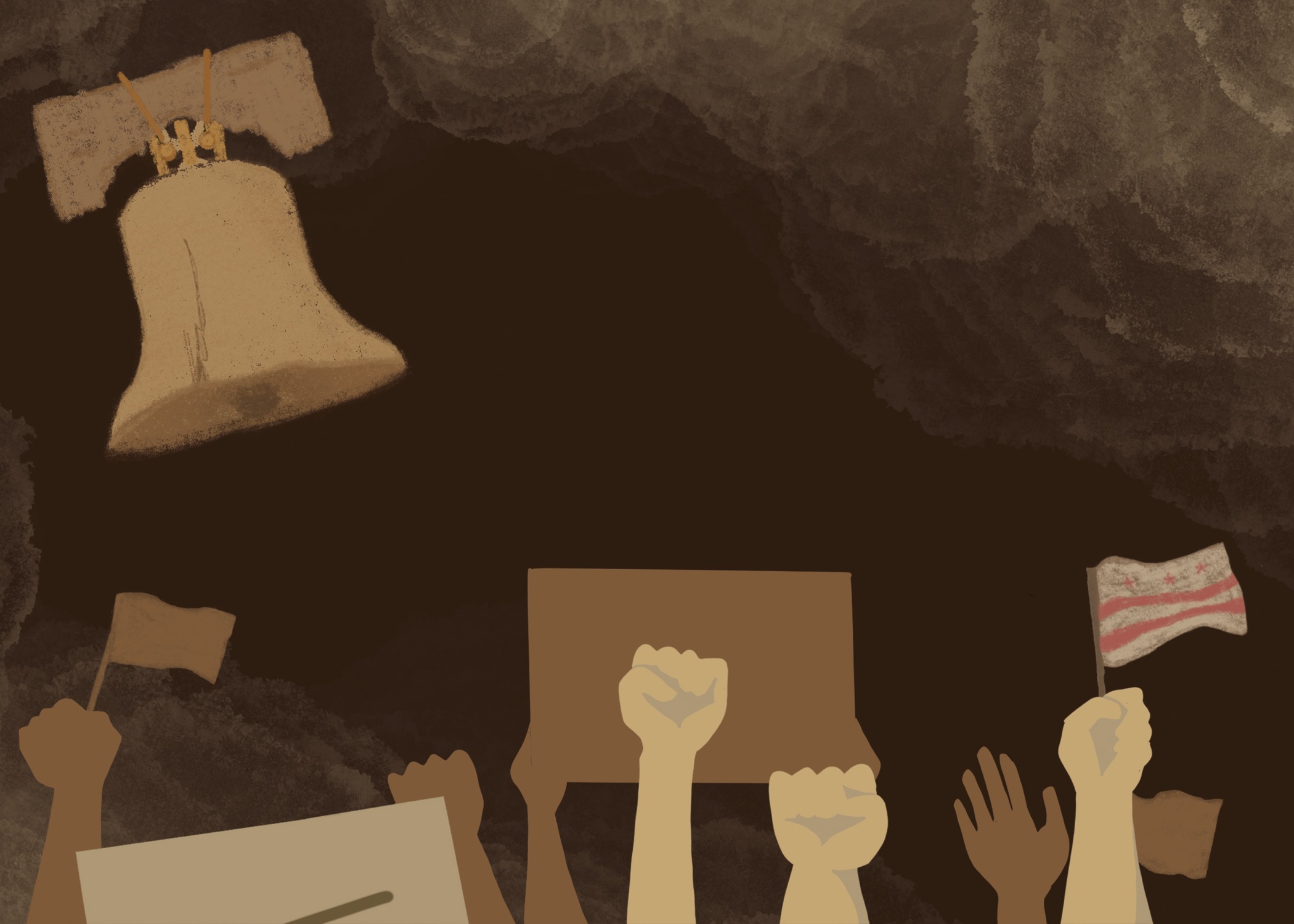Content warning: This article includes mention of sexual violence.
Editor’s Note: This letter from the editors is a concurring opinion with The Hoya.
Dear Interim President Robert Groves and Senior Vice President Joseph Ferrara:
As the editors of The Georgetown Voice, we spend our time listening to our fellow students, faculty, and community members. They are afraid.
They are not alone in their fear. Thousands of articles have been written on the dangers a second Trump presidency will bring both locally and abroad, to say nothing of how he has emboldened hateful rhetoric and the oppressive policies of the Republican majority in the House and the Senate. We join them; his presidency poses drastic threats—of mass deportation, of shuttering the Department of Education, and more—to the day-to-day lives of Georgetown students.
The Voice’s mission is to present and analyze issues of concern to the community. We write letters like these because we believe the university has a responsibility to its students. We believe in the full nourishment of our community, but that can never happen while students are under threat at the highest level. It is the responsibility of the university to protect us because no student can alone.
Georgetown is an institution that wields extensive moral, financial, and political power. You, as leaders of our university, must exercise this power to protect its student communities, otherwise the university’s Jesuit principles are just words.
The window to prepare before a second Trump presidency threatens the rights, freedoms, and lives of marginalized communities is short. Georgetown must take measures now to resist Trump’s extremism and effectively shield all members of our community from his administration.
Protecting survivors
Survivors of campus sexual violence are not lifeless statistics; they are real people whose lives were disrupted by a dehumanizing violation. Too many students at Georgetown can testify to this reality.
The Title IX regulatory changes in Trump’s first term were violent, humiliating, discriminatory, and overall catastrophic for survivors. In a 2020 revision, the Trump administration drastically limited the scope of sexual misconduct that universities are required to investigate, creating further obstacles for survivors’ to report a range of violating actions. Trump’s guidelines also allowed universities to raise the burden of proof in Title IX proceedings and mandated cross-examinations of reporting students by attorneys—a provision that can make an already painful process excruciating.
In a second term, Trump has promised more: he has pledged to eliminate the Department of Education, which enforces Title IX, and he plans to rescind the Biden administration’s definition of “sex-based harassment,” which includes harassment based on gender and sexuality, harming queer folks, women, and gender-marginalized people in our community. Under a Trump presidency, it is Black communities, particularly Black femmes, that are at greatest risk of sexual violence, both due to his normalization of assault and his hateful, racist rhetoric.
As federal protections for students erode, Georgetown must retain survivor-centric policies around the burden of proof and definitions of misconduct, in addition to providing students with advocates to navigate Title IX proceedings. While the university must comply with federal guidance, it must also provide a fair and just process for all parties involved in a Title IX case. To compensate for the lack of regulatory support, the university should commit to modifying the code of conduct to codify pre-Trump guidelines, as it did in 2020.
It must work with the student body through proactive outreach to ensure that survivors are protected and supported, regardless of what federal guidelines say. This is more important than ever in light of the recently released 2024 Sexual Misconduct Survey, which showed that Georgetown had some of the highest rates of sexual misconduct compared to peer institutions.
The university must also bolster resources that affirm students’ gender identities and sexualities. The LGBTQ Resource Center has not had a full-time director since 2021. Under a Trump presidency, it is even more crucial that the university hires both a full-time director and associate director to help queer students navigate legal, financial, social, and emotional challenges as Trump pledges to strip away non-discrimination policies and restrict LGBTQ+ and gender-affirming health care.
The center must support students materially: helping them navigate the legal and administrative challenges for changing name and gender on official documents and IDs, ensuring access to queer-affirming and safe healthcare, and responding to concerns over eroding discrimination protections and reductions in avenues for queer survivors to seek recourse through Title IX. The center must hold space for queer students’ concerns about an increasingly hateful and invalidating political environment, which threatens both emotional and physical harm.
In an era where a man who has been held civilly liable for sexual assault holds our nation’s highest office, Georgetown must reemphasize that rape culture is not welcome here.
The university must care for its survivors, and that care must be genuine. That care should not simply be rooted in fear of legal retribution, present only during Sexual Assault Awareness Month, or reactive to harmful regulatory changes. Regardless of a Trump presidency, the reality that one in four undergraduate women and one in 10 undergraduate men report having experienced sexual violence is an emergency worthy of every university resource. We strongly urge you to treat it as such.
Protecting undocumented and international students
Trump has pledged to utilize the Alien Enemies Act of 1798 to ensure the mass deportation of undocumented immigrants “on day one.” His promise threatens the 23,000 recipients of the Deferred Action for Childhood Arrivals program (DACA) who reside in the DMV area, approximately half of whom are in school or attend college. This, too, is not without precedent; successive legal challenges over the last Trump presidency severely weakened the DACA program, resulting in a 51% drop in undocumented enrollment in California universities.
Georgetown’s first priority must be to inform undocumented Hoyas of their rights and means of working and studying in the United States. It must also shore up its support for these students’ emotional well being through Counseling and Psychiatric Services (CAPS) and the Undocumented Students Working Group, as they endure legal, financial, social, emotional, and familial hardship during Trump’s second term.
Trump’s campaign has escalated anti-immigrant propaganda and sentiment just as anti-immigrant laws surge at the state level, empowering local officials to arrest and prosecute people suspected of having illegally entered the country and paving the way for rampant racial profiling.
Now holding broad presidential powers and near total immunity, Trump’s plan to use the U.S. military to carry out violent deportations is a threat that must be taken extremely seriously. To defend its communities, Georgetown has a significant responsibility to legally challenge any directives that impact immigrant students and their families.
In the past, Georgetown has co-signed legal challenges to ICE directives, travel bans on majority Muslim countries, and attempts to end DACA. The university’s legal solidarity with undocumented and international students must continue—and expand—in a second Trump presidency.
In Trump’s second term, more must be done to communicate with undocumented and international students, facilitate and protect F-1 visa statuses, ensure safe housing, and negotiate a sustainable academic environment amid emotional and familial challenges. We ask that Georgetown strengthen its efforts as violent policy against immigrant communities comes from the highest levels of the U.S. government.
Protecting academic freedom and student protest
Trump plans to wield federal money and alter policies to combat what he sees as “left-wing indoctrination.” Trump has explicitly said he wants to punish schools with Diversity, Equity, and Inclusion (DEI) policies by filing lawsuits for “racial discrimination” and fining or withholding federal funds from schools that refuse to shutter their DEI programs. Trump has also threatened to apply an endowment tax and weaponize the accreditation process to compel universities to comply.
The term “DEI” has been appropriated by the right to represent any idea that challenges a white supremacist and Christian nationalist viewpoint of the world. While it seems improbable for Trump’s actions to impact Georgetown’s diversity programs and academics, they broadly threaten academic free speech and aim to create a society based on white hegemony.
Georgetown should bolster departments that will come under fire by the right’s campaign against free thought. The university should expand tenure line facultyships in areas like Black studies, women and gender studies, Indigenous studies, and Asian American studies. These fields seek to dismantle violence against marginalized communities and elevate the experiences of people underrepresented in the academy.
In addition to protecting academic departments potentially undermined by a Trump presidency, Georgetown can proactively defend academic freedoms by ensuring students’ right to protest. Trump has a track record of authorizing police force against protesters. He has said he would deport international students protesting U.S. involvement in Israel’s continuous, violent assault in Gaza. If Trump is serious about this claim, Georgetown must be proactive in protecting its students by denying campus access to police or military units seeking to detain them, and by lending legal and rhetorical support for free speech. Without free speech and free thought, what good is higher education?
Escalating violence abroad
Trump has promised to terminate military aid to Ukraine, provide continued support for Israel’s genocide in Gaza and bombardment of Lebanon and Syria, ensure unwavering support for Israel’s illegal West Bank settlements, and more. Trump’s foreign policy will materially and horrifically impact the lives of Georgetown community members from these regions.
Hamas’s Oct. 7 attacks and Israel’s subsequent assault on the Gaza Strip have inflicted a brutal emotional toll that many members of our community carry every day. In Georgetown’s overwhelming academic and work driven culture, most mechanisms for support have fallen short.
We argue that the expansion of emergency financial aid, housing options, and visa assistance for students whose lives are upended by military aggression is especially vital now. This support should come in conjunction with the university addressing its own complicity by divesting from companies arming and profiting from Israel’s genocide in Gaza. Community members have recently put forth a proposal to the Committee on Investments and Social Responsibility that recommends an actionable human rights screen on our investments, and we urge you to support it.
Some of this work, namely the expansion of financial aid, has already started. This past year, the Center for Contemporary Arab Studies fundraised scholarships for four graduate students from Gaza. In 2022, Georgetown received a $5 million private donation to support 14 Ukrainian students. The university should work to collect more funds to ensure that students impacted by global conflict have a sustainable financial pathway to higher education at the Hilltop.
Georgetown can also work to bolster other, non-financial support for its community members. Following Russia’s invasion of Ukraine in 2022, Georgetown reached out directly to impacted community members, offering mental health resources. The university must extend this kind of outreach to other community members, including students from Lebanon and the occupied Palestinian territories. Moreover, Georgetown must dedicate resources to expanding CAPS while also building out thorough frameworks for academic flexibility to support impacted students.
Georgetown already has a blueprint for meaningful action with their comprehensive support of Ukrainian students. Now, the university must extend that support to all students facing the impacts of violence abroad.
Protecting Georgetown’s commitment to need-blind financial aid
Trump has called for the complete dismantling of the Department of Education (DoE) and the reassignment of its programs to other departments. DoE administers FAFSA, the form which calculates and sends the Expected Family Contribution to colleges. Last year’s disruptive FAFSA roll out resulted in the delayed receipt of many students’ financial aid packages, and this is expected to continue with the DoE’s announcement of more delays. The dismantling of the DoE and the reassignment of its staff will only exacerbate students’ obstacles within Georgetown’s financial aid process, which has been plagued by delays and communication challenges. Trump’s policy may have very real impacts on student lives, namely, that Hoyas are prevented from coming to Georgetown in the first place due to prohibitive costs.
On top of the logistical pains, Trump will likely slash federal financial aid programs: every year of his first term, Trump proposed significant reductions to financial aid and work study programs, and with full Congressional control this time around, student debt forgiveness, work-study, and academic support like Upward Bound are all likely on the chopping block.
Trump’s pledge to dismantle DoE may also lead to budget shortfalls in the Pell Grant program, which will harm the Georgetown students who depend on this funding. The Class of 2028 is nearly 15% Pell eligible, all of whom may be impacted by regulatory changes. As Georgetown seeks to increase the numbers of admitted Pell eligible students, it must simultaneously provide GSP with more funding to support students.
Georgetown must also prioritize the financial needs of its students over investment into new, costly initiatives. The Call-to-Be campaign, which is bankrolling the billion dollar Capitol Campus expansion, could be diverted to protect Georgetown’s commitment to financial aid, even as federal support ends. If the university can muster the will—and the funds—to invest in a long-term prestige project downtown, it must extend greater will toward sustaining critical, established programs, like GSP and financial aid. Otherwise, expanding outward while reducing support for existing programs is not growth. Rather, it’s top-down negligence of Georgetown’s most marginalized and at-risk students in disguise.
…
We return to Georgetown’s mission: “The university was founded on the principle that serious and sustained discourse among people of different faiths, cultures, and beliefs promotes intellectual, ethical and spiritual understanding.” Georgetown cannot retain a commitment to this mission without decisively, publically, and institutionally countering the dangers of a second Trump presidency. More than ever before, Georgetown’s marginalized students are at an increased risk of political, social, and legal retribution. At the same time, Georgetown’s academic community is under threat from a White House that promotes white, masculine, anti-scientific, and ahistorical hegemonic thinking as the nation’s status quo and undermines any viewpoints that defy it.
The Trump administration will only deepen pre-existing scars in this nation and further deteriorate a system that already fails to protect its most vulnerable. Now is the time for Georgetown’s administration to strategize and enact proactive policies and resources to limit the harms of Donald Trump’s new regime.
With hope,
Ajani Jones, Editor-in-Chief
Connor Martin, Managing Editor
on behalf of the General Board of The Georgetown Voice





